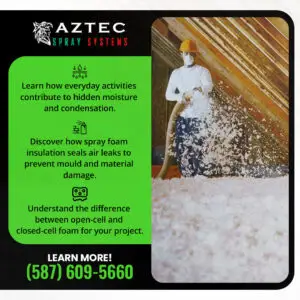To maintain your Calgary spray foam insulation system effectively, you'll need to implement regular inspections and moisture control measures. Check for water stains, musty odors, and air leaks at least twice yearly, focusing on attics and basements where moisture issues commonly develop. You should monitor your energy bills for unexpected spikes that might indicate insulation problems, and guarantee proper ventilation throughout your home to prevent excess humidity. Professional assessments every few years will help identify hidden issues and uphold peak performance. Understanding these crucial maintenance practices will enhance your insulation's 20+ year lifespan and energy efficiency benefits.
Key Takeaways
- Schedule bi-annual inspections during spring and fall to check for moisture damage, considering Calgary's extreme temperature fluctuations.
- Monitor attic ventilation year-round to prevent ice dam formation in winter and excessive heat buildup during Calgary summers.
- Apply protective UV coatings on exposed spray foam surfaces to shield against Alberta's intense sunlight exposure.
- Check for air leaks around windows and doors seasonally, as Calgary's freeze-thaw cycles can create gaps in insulation.
- Maintain consistent indoor humidity levels between 30-50% using dehumidifiers to protect spray foam integrity in Calgary's dry climate.
Understanding Your Spray Foam System
Regular inspections are crucial to maintain insulation integrity and prevent moisture problems that can lead to mold growth. You'll want to verify proper ventilation throughout your space, as high humidity levels can greatly impact your insulation's effectiveness. Keep the environment clean and free from dust and debris that could compromise performance. Understanding your system's lifespan, typically exceeding 20 years, helps you plan for maintenance needs and sustain ideal energy efficiency. Monitor these factors consistently to protect your investment and maintain peak insulation performance.
Regular Inspection Guidelines
To maintain ideal spray foam performance, implementing systematic inspection protocols protects your insulation investment. You'll need to conduct annual inspections, checking specifically for water stains, musty odors, and signs of insulation deterioration that could compromise your home's energy efficiency.
Monitor your energy bills for unexpected increases, as they're often the initial indicator of compromised insulation integrity. During your inspections, pay close attention to potential air leaks, examining the spray foam insulation for gaps or cracks that may have developed. Verify your ventilation systems are operating correctly to prevent moisture issues that could damage the insulation over time.
Don't rely solely on self-inspection – schedule professional assessments every few years. Qualified contractors can identify subtle problems you might miss, helping maintain your insulation's long-term performance and effectiveness.
Moisture Control Best Practices
Since moisture poses a significant threat to spray foam insulation's effectiveness, implementing robust control measures safeguards your investment. You'll need to maintain adequate ventilation throughout your Calgary property to prevent excessive humidity levels that can compromise insulation performance.
Monitor your space regularly for water stains or musty odors, as these indicators suggest hidden moisture issues requiring immediate action. To optimize moisture control, seal gaps in your building envelope to reduce unwanted air leakage. Don't overlook the importance of addressing condensation sources and leaks promptly – these issues can lead to mold and mildew growth within your insulation system. For improved protection, apply protective coatings to exposed spray foam areas. Regular inspections should focus on identifying potential moisture-related problems before they escalate into costly repairs.
Seasonal Maintenance Requirements
Maintaining your Calgary spray foam insulation throughout changing seasons demands a structured approach to protect your investment. While spray foam insulation offers superior performance, you'll need to conduct bi-annual visual inspections to check for signs of damage or moisture buildup. During these checks, ascertain proper ventilation in your attic and basement spaces to enhance insulation effectiveness.
You'll want to monitor energy bills each season, as unexpected spikes can signal potential issues with your spray foam insulation installation. Clear any debris from vents and insulation surfaces to sustain peak energy efficiency. For thorough seasonal maintenance requirements, schedule a professional insulation inspection every few years. This expert assessment will verify your insulation's thermal performance and moisture resistance, helping you maintain peak performance through Calgary's diverse weather conditions.
Energy Performance Monitoring
Effective energy performance monitoring serves as your primary line of defense in maintaining spray foam insulation efficiency in Calgary homes. You'll want to track your energy bills consistently, watching for unexpected spikes that could signal insulation issues or compromised insulation integrity.
Install smart meters or energy monitoring tools to analyze your daily consumption patterns, helping you identify potential air leaks or areas where insulation effectiveness may be declining. Schedule regular professional evaluations of your insulation services every few years, and don't forget to inspect your heating and cooling systems seasonally. These proactive measures can result in significant energy savings of up to 30% annually when you address problems promptly. Combining routine inspections with systematic energy performance monitoring guarantees your spray foam insulation continues delivering peak energy efficiency year-round.
Professional Assessment and Repairs
Regular professional assessments complement your energy monitoring efforts by providing expert-level evaluations of your spray foam insulation's condition. You'll need trained professionals to conduct thorough inspections at least annually to maintain insulation effectiveness and protect your investment.
Key aspects of professional assessment include:
- Detailed evaluation of insulation integrity
- Detection of hidden moisture problems
- Identification of potential air leaks
- Assessment of compliance with local building codes
- Documentation of areas requiring professional maintenance
When issues are identified, don't delay repairs. Your contractor will implement targeted solutions, from resealing gaps to reinforcing compromised areas. This proactive approach helps prevent minor issues from escalating into major problems that could compromise your insulation's performance. Remember, professional maintenance isn't just about fixing problems—it's about ensuring your spray foam insulation continues to deliver peak results year after year.
Common Issues and Solutions
Even the best-installed spray foam insulation can develop issues over time, but knowing what to look for helps you address problems before they escalate. Regular inspections for water stains and musty odors are essential to detect potential moisture issues that could compromise your insulation effectiveness.
If you notice signs of air leakage or degraded performance, you'll need to seal gaps in your building envelope promptly. Don't wait to address water-related problems, as these can quickly lead to mold growth and extensive damage. Keep your spray foam clean using a soft brush or vacuum, but avoid harsh cleaning agents that might deteriorate the material. For ideal maintenance, schedule routine inspections with professional contractors who can identify subtle issues and implement proper solutions before major problems develop.




